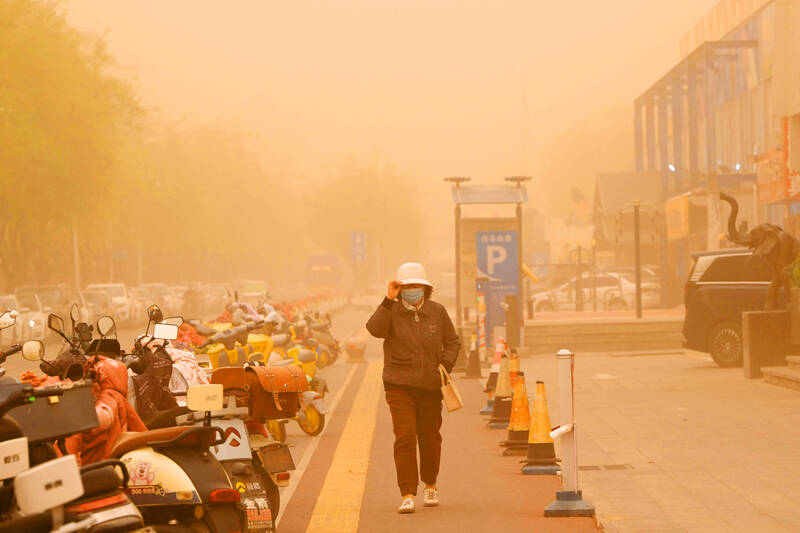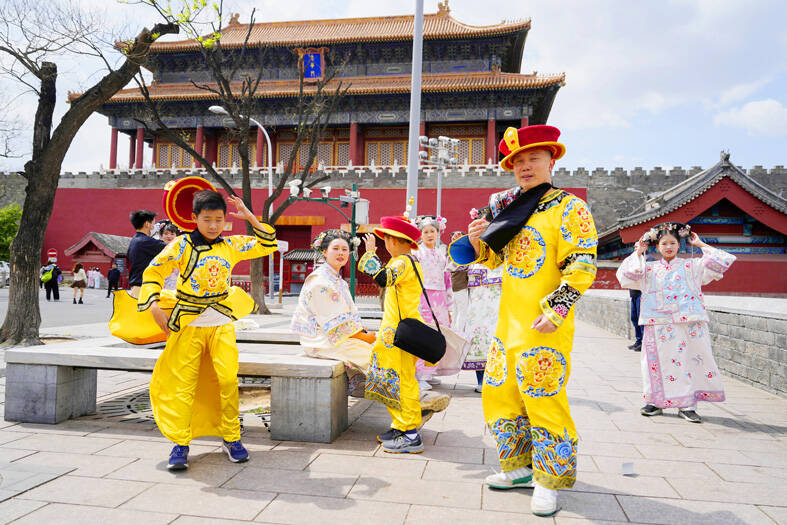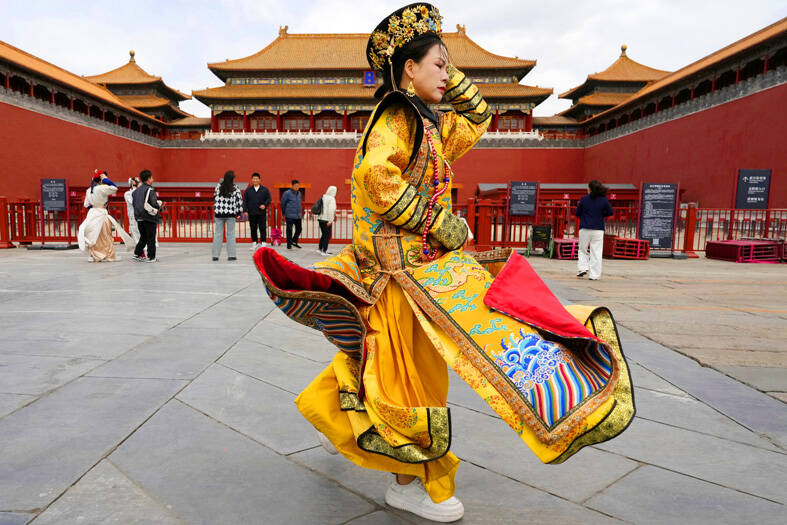China’s capital hunkered down yesterday as rare typhoon-like gales swept northern regions, forcing the closure of historic sites and disrupting travel while bringing late snowfalls and hailstone showers in some areas.
Windows shook and cars were rocked by gusts of wind driven by a cold vortex from neighbouring Mongolia that sent temperatures plunging more than 12°C.
The winds, which began on Friday, are set to continue over the weekend, with gusts of up to 150kph, the official Xinhua news agency said.

Photo: AFP
They brought late snowfalls in Inner Mongolia and hailstones in southern China.
Beijing issued its second-highest gale alert this weekend, for the first time in a decade, warning 22 million residents to avoid non-essential travel as winds could potentially break April records dating from 1951.
By 11:30am yesterday, 838 flights had been canceled at the capital’s two major airports.

Photo: AP
Tourist attractions including the Summer Palace, Temple of Heaven, Beijing Zoo and the Universal Studios theme park were also temporarily closed yesterday.
Almost 300 trees in the Chinese capital had toppled and 19 vehicles had been damaged, CCTV said, adding that no injuries due to the strong winds had been reported in Beijing yet.
The winds forced the postponement of a half-marathon set for today featuring humanoid robots competing with humans in a bid to showcase China’s technological advances.

Photo: AP
Sandstorms raging over a stretch from Inner Mongolia to the Yangtze River region crippled road travel in eight provinces, state broadcaster CCTV and Xinhua said.
Strong winds bringing sand and dust from Mongolia are routine in spring, but climate change has made weather events more extreme.
China is the world’s biggest emitter of the greenhouse gases that scientists say are driving climate change and making extreme weather more frequent and intense.
Dozens of people were killed and thousands evacuated during storms that caused severe flooding around the country last year.
In May last year, a highway in southern China collapsed after days of rain, killing 48 people.
Additional reporting by AFP

MONEY GRAB: People were rushing to collect bills scattered on the ground after the plane transporting money crashed, which an official said hindered rescue efforts A cargo plane carrying money on Friday crashed near Bolivia’s capital, damaging about a dozen vehicles on highway, scattering bills on the ground and leaving at least 15 people dead and others injured, an official said. Bolivian Minister of Defense Marcelo Salinas said the Hercules C-130 plane was transporting newly printed Bolivian currency when it “landed and veered off the runway” at an airport in El Alto, a city adjacent to La Paz, before ending up in a nearby field. Firefighters managed to put out the flames that engulfed the aircraft. Fire chief Pavel Tovar said at least 15 people died, but

LIKE FATHER, LIKE DAUGHTER: By showing Ju-ae’s ability to handle a weapon, the photos ‘suggest she is indeed receiving training as a successor,’ an academic said North Korea on Saturday released a rare image of leader Kim Jong-un’s teenage daughter firing a rifle at a shooting range, adding to speculation that she is being groomed as his successor. Kim’s daughter, Ju-ae, has long been seen as the next in line to rule the secretive, nuclear-armed state, and took part in a string of recent high-profile outings, including last week’s military parade marking the closing stages of North Korea’s key party congress. Pyongyang’s official Korean Central News Agency (KCNA) released a photo of Ju-ae shooting a rifle at an outdoor shooting range, peering through a rifle scope

South Korea would soon no longer be one of the few countries where Google Maps does not work properly, after its security-conscious government reversed a two-decade stance to approve the export of high-precision map data to overseas servers. The approval was made “on the condition that strict security requirements are met,” the South Korean Ministry of Land, Infrastructure and Transport said. Those conditions include blurring military and other sensitive security-related facilities, as well as restricting longitude and latitude coordinates for South Korean territory on products such as Google Maps and Google Earth, it said. The decision is expected to hurt Naver and Kakao

India and Canada yesterday reached a string of agreements, including on critical mineral cooperation and a “landmark” uranium supply deal for nuclear power, the countries’ leaders said in New Delhi. The pacts, which also covered technology and promoting the use of renewable energy, were announced after Indian Prime Minister Narendra Modi and Canadian Prime Minister Mark Carney hailed a fresh start in the relationship between their nations. “Our ties have seen a new energy, mutual trust and positivity,” Modi said. Carney’s visit is a key step forward in ties that effectively collapsed in 2023 after Ottawa accused New Delhi